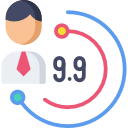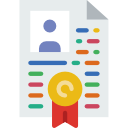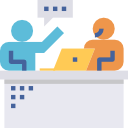Interview
An interview is an interactive process for mutual assessment and evaluation of suitability for the job, mainly the interviewer assessing the interviewee. In a sense, the interview is the key to the success of the application.
Tips for a Successful Interview

Self-evaluation
Understand yourself, including your strengths, weaknesses and career objectives.
Make sure you are able to showcase your abilities during the interview.

Research the company
Impress the employer by having good knowledge of the company you are applying and the up-to-date market information, as well as current social affairs.

Prepare your résumé
Bring along your résumé with you just in case the interviewer needs an extra copy.

Practice your interview
Prepare answers to the questions which the interviewer is likely to ask. Practice makes perfect.

Remember the interview skills
Be punctual, well-groomed and well-prepared;
Use appropriate tone – not too fast, slow, or high-pitched;
Always wear a smile, keep eye contact and nodding;
Be organized and logical in your thinking; give sensible answers;
In case you make a mistake in your answer, rectify immediately. If you do not understand the question, ask the interviewer to explain it more clearly.
Tips for a Successful Interview
Self-evaluation
Understand yourself, including your strengths, weaknesses and career objectives.
Make sure you are able to showcase your abilities during the interview.
Research the company
Impress the employer by having good knowledge of the company you are applying and the up-to-date market information, as well as current social affairs.
Prepare your résumé
Bring along your résumé with you just in case the interviewer needs an extra copy.
Practice your interview
Prepare answers to the questions which the interviewer is likely to ask. Practice makes perfect.
Remember the interview skills
Be punctual, well-groomed and well-prepared;
Use appropriate tone – not too fast, slow, or high-pitched;
Always wear a smile, keep eye contact and nodding;
Be organized and logical in your thinking; give sensible answers;
In case you make a mistake in your answer, rectify immediately. If you do not understand the question, ask the interviewer to explain it more clearly.
Frequently Asked Questions in an Interview
- Please briefly introduce yourself.
- What are your strengths and weaknesses?
- What makes you choose to work in this particular field?
- Can you give me a reason(s) which makes you so special that we should hire you among all the applicants?
- What is your career expectation/objective?
- What kind of jobs are you looking for?
- What did you learn from your previous work experience and how can they help you in this job that you are applying for?
- When you encountered problems in the past, how did you solve them?
- What do you know about the job you are applying for? What are the responsibilities?
- What makes you think that you are suitable for this position?
- How can you contribute to our company if we decide to hire you?
- Which factors would you consider the most significant when selecting your job?
- Do you accept overtime work or irregular working hours?
- What is your expected salary?
- Have you applied for other jobs? What are they?
- If your boss had a point of view or direction different from yours, what will you do?
- How much do you know about our company?
- What makes you desire to work for us?
- How do you see the prospects and development in our field?
- Which companies do you think are our competitors in the market? What do you think of them?
- Do you have any life goals?
- How do you see yourself in 3 to 5 years? What will you be doing then?
- Do you have any plans for further study?
- If a customer becomes dissatisfied with the service you or your partner renders and threatens to make a complaint against you, what would you do?
- If a certain pack of the product fails to reach the customer on time as a result of your mistake, and your supervisor is unaware of it, what would you do?
- Can you share with us a piece of news that you are concerned about recently?
- What is your opinion on that piece of news?
- What else do you need to know about me to make a hiring decision?
- What are some of the difficult problems one would have to face in this position?
- What are the company’s expectations for new staff?
- What training opportunities are available?
- When will I receive notice of the hiring decision?
- Are there any promotion opportunities available for the successful candidate in this position?

Interview Preparation Checklist
To avoid missing anything, you should prepare your interview according to the following checklist:
Before Interview
Research information about understanding yourself and the applied position
Research industry background and company information
Prepare a set of questions that the interviewer is likely to ask
Think about the suitable answer for each question
Practice the interview
Prepare your questions to ask the interviewer
Familiarize with current social affairs
Review your résumé
Groom well (your dress, your appearance)
(Ladies: dress or suit, stockings and high heels instead of sandals; tie long hair)
(Gentlemen: suit, tie and dress shoes in conservative colours)Prepare the documents that you need to bring along to the interview (e.g. CV, certificates)
Plan well on getting to the interview location
Prepare a writing pad for note taking
Go to bed early and ensure enough sleep
On the Day of Interview
Be punctual, better to arrive at the interview location 15 minutes earlier
If you need to fill in an application form, do it carefully
Be polite to all staff whom you approach
Greet the interviewer (e.g. Good morning/ Good afternoon)
Pay attention to your manner and follow the interviewer’s instruction
Keep eye contact and nodding
Respond in accordance with the language the interviewer uses
(If the interviewer speaks to you in English, reply in English)Smile, say goodbye and thank the interviewer before leaving
What to Do after Interview –
Send Thank You Letter and Follow Up
After the interview, send a thank you letter to the employer to show your appreciation for the interview opportunity and eagerness for hearing from them. The interviewer will be impressed by a good thank you letter, which may increase your chance to get the job. It singles you out from other candidates and shows your interest in the job. Furthermore, it is a platform to provide a better response to the questions you were asked during the interview.
Sample thank you letter
1B, YY Building
XX Street, Macao
7 May 2019
Mr. Tom Chan
Human Resources Manager
ABC Lifestyle Magazine
Avenida Doctor Mario Soares Macau
Dear Mr. Chan,
Thank you for the interview opportunity for the position of Marketing Executive. The interview allowed me to understand more about the job and the company. I hope I can have the opportunity to contribute my experience and knowledge to your company.
Given my enthusiasm and good communication skills, I am very confident that I am competent for this job and able to cooperate with colleagues in the department.
I appreciate your time interviewing me. I am very interested in working with you and looking forward to hearing from you soon.
Yours sincerely,
Michael Fong
Michael Fong Tai Man
Send an email or give a call to follow up with your application if you do not receive any reply from the interviewer after a period of time.
Practice makes perfect. Make an appointment with us for doing a Mock Interview or attend regular Mock Interview Sessions to enhance your interview performance. Details can be found through Student E-bulletin Board and our Wechat.
